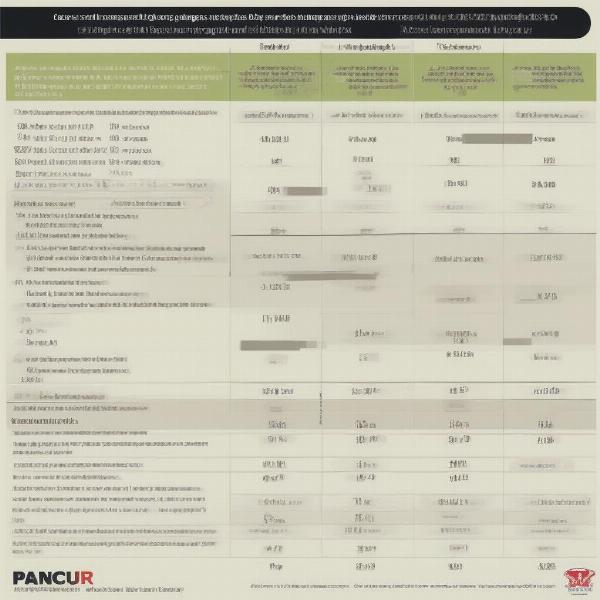Panacur, also known by its generic name fenbendazole, is a common broad-spectrum dewormer used for dogs. Understanding the correct panacur dosage for dogs is crucial for effectively treating intestinal parasites while ensuring your furry friend’s safety. This guide will provide you with all the essential information you need regarding Panacur dosage, administration, and potential side effects.
Understanding Panacur for Dogs
Panacur works by disrupting the metabolic processes of various internal parasites, including roundworms, hookworms, whipworms, and some types of tapeworms. It’s important to note that Panacur does not kill all types of worms, so consulting your veterinarian for proper diagnosis and treatment is always recommended. They can determine the specific type of parasite affecting your dog and recommend the appropriate Panacur dosage.
Panacur Dosage for Dogs: General Guidelines
The standard Panacur dosage for dogs is 50 mg/kg (22.7 mg/lb) of body weight per day, given orally for three consecutive days. This dosage is typically effective against most common intestinal parasites. However, for certain parasites like Giardia, your veterinarian might recommend a higher dosage or a longer treatment period.
Calculating the Correct Dosage
To calculate the right amount of Panacur for your dog, you’ll need to know their weight in kilograms or pounds. If you have their weight in pounds, convert it to kilograms by dividing by 2.2. Then, multiply the weight in kilograms by 50 mg/kg to get the total daily dose in milligrams. Panacur comes in various forms, including granules, suspension, and tablets, each with different concentrations. Your veterinarian will guide you on choosing the appropriate form and calculating the exact amount to administer based on your dog’s weight and the product’s concentration.
 Panacur Dosage Chart for Dogs
Panacur Dosage Chart for Dogs
Different Forms of Panacur and Their Administration
Panacur comes in various forms, each with its own method of administration:
- Panacur Granules: These granules can be mixed directly with your dog’s food. This is often the easiest way to administer Panacur, especially for picky eaters.
- Panacur Suspension: This liquid form can be given using a syringe or dropper, placed directly into your dog’s mouth.
- Panacur Tablets: Some dogs readily accept tablets, while others might require them to be crushed and mixed with food.
Regardless of the form, ensure your dog consumes the entire dose.
Potential Side Effects of Panacur
Panacur is generally considered safe for dogs. However, some dogs might experience mild side effects, such as:
- Vomiting
- Diarrhea
- Loss of appetite
If you observe any severe or persistent side effects, contact your veterinarian immediately.
When to Consult a Veterinarian
While this guide provides general information, it’s crucial to consult your veterinarian before administering Panacur to your dog. They can accurately diagnose the type of parasite, determine the appropriate dosage and duration of treatment, and advise you on any potential risks based on your dog’s health history.
Conclusion
Administering the correct panacur dosage for dogs is essential for effective parasite treatment. Always consult with your veterinarian for a proper diagnosis and tailored dosage recommendations. By following their guidance and understanding the information presented in this guide, you can help keep your furry companion healthy and parasite-free.
FAQ
- How often should I deworm my dog with Panacur? Your veterinarian will determine the appropriate deworming schedule based on your dog’s lifestyle, age, and risk factors.
- Can I give Panacur to pregnant dogs? Consult your veterinarian before giving Panacur to a pregnant or lactating dog.
- What if my dog vomits after taking Panacur? Contact your veterinarian for advice. They might recommend re-administering the dose or suggesting an alternative treatment.
- Can I buy Panacur over-the-counter? In some regions, Panacur might be available over-the-counter. However, it’s always best to consult your veterinarian before administering any medication.
- What should I do if I suspect my dog has worms? Schedule an appointment with your veterinarian for a proper diagnosis and treatment plan.
- Are there any preventative measures I can take against worms? Regularly cleaning up your dog’s feces, preventing them from scavenging, and maintaining good hygiene can help reduce the risk of worm infestations.
- Can Panacur be used for other animals besides dogs? Panacur is also used for other animals, but the dosage and administration may vary. Consult with a veterinarian for appropriate guidance.
ILM Dog is a leading international online resource dedicated to providing expert advice and information on all aspects of dog care and wellbeing. From breed selection and puppy care to senior dog health and training tips, ILM Dog offers a wealth of resources for dog owners worldwide. We cover a wide range of topics, including health and medical care, nutrition, grooming, and product recommendations, helping you make informed decisions for your beloved canine companion. For any inquiries or expert advice, reach out to our team at [email protected] or call us at +44 20-3965-8624. ILM Dog is your trusted partner in responsible dog ownership.